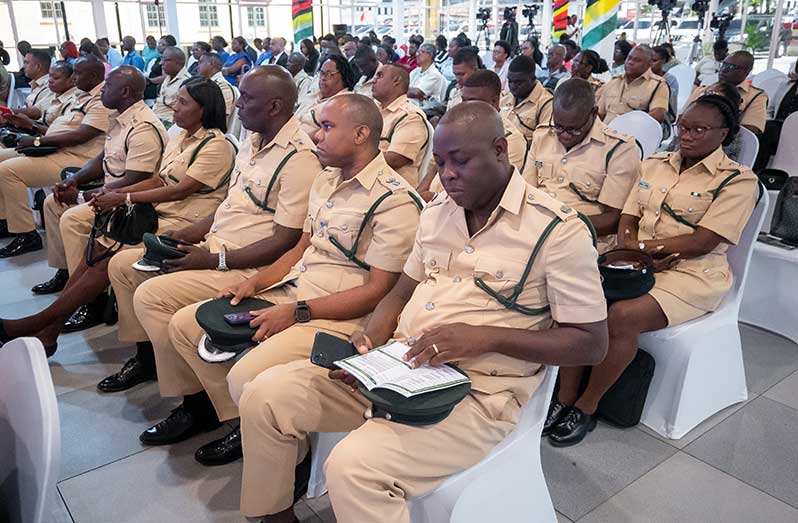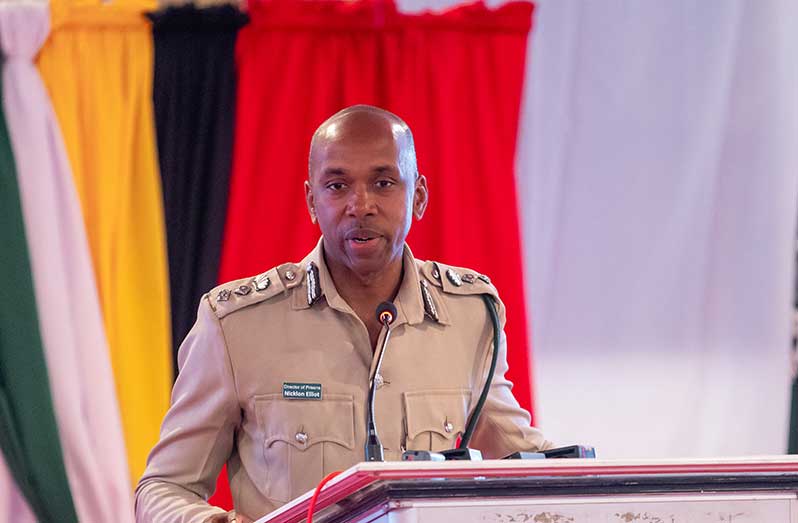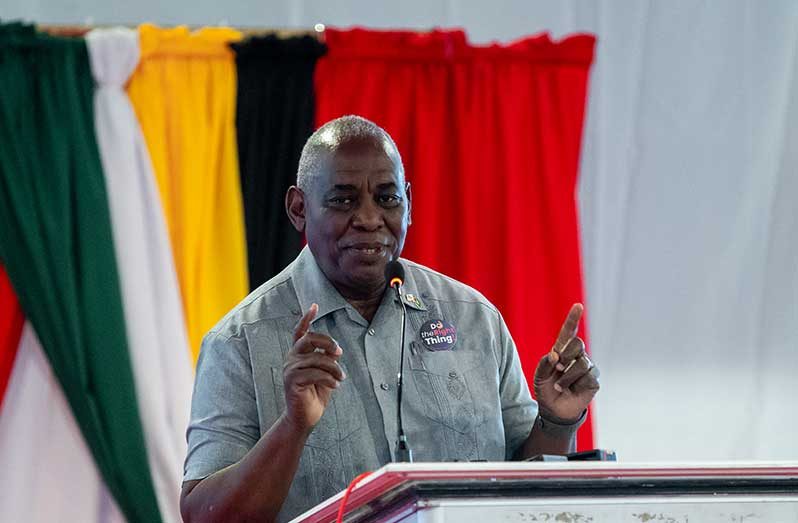–lauds efforts to reform prisoners
HOME Affairs Minister Robeson Benn has called for a deep reflection on Guyana’s historical struggles and an urgent shift in cultural mindset to address crime and rehabilitation, and achieve national peace.
During the opening of the Guyana Prison Service Senior Officers’ Conference, Minister Benn underscored the importance of understanding the country’s multiracial, multicultural, and multi-religious heritage to forge a unified and progressive society.
Benn urged Guyanese to engage in retrospective analysis to grasp the roots of national identity and purpose.
He emphasised that peace must serve all citizens equally and must be built on a collective acknowledgment of history. He said Guyana’s entire history is marked by trials and oppression, from the genocide of Indigenous Peoples to African slavery, and indentureship.
“We often forget, particularly easily, that we live in a multiracial, multicultural society. We are the result of colonial experiences—of being made to hate each other, of being a country where, at various points in time, the whole nation was a prison. We had the genocide of our Amerindians; we had African slavery; we had the indentureship of all the other [races].”
These experiences, he noted, have left deep scars but have also shaped the country’s resilience and aspirations.
Minister Benn highlighted the evolving nature of crime in Guyana and the wider Caribbean, particularly transnational organised crime. He pointed to statistics that indicate the region is one of the most violent in the world, with issues ranging from drug and arms trafficking to homicides.

He said the infiltration of foreign criminal networks has complicated law enforcement efforts, requiring a multi-faceted approach to security.
He commended the Guyana Police Force (GPF) for its dedication in tackling criminal elements and noted that despite challenges, Guyana has a relatively high crime resolution rate of over 55 per cent. However, he acknowledged that law enforcement alone is not sufficient; rehabilitation and reintegration of offenders must also be prioritised.
According to him, many of those incarcerated were not born criminals; they are products of society, shaped by poverty, neglect, and societal influences.
APPLAUDS REFORM EFFORTS
In this regard, the minister applauded the ongoing efforts within the prison system to educate and reform inmates.
Minister Benn posited: “We need to see the men working—where they are doing useful things, learning, and, along with the Fresh Start Initiative, we will be able to turn them out into useful activities where they can earn money and help their families and themselves. They will earn better self-respect. They’ll be better able to integrate and support their families and don’t fall back into drugs and bad behaviour.”
Farming programmes, educational initiatives, and the Fresh Start Initiative are critical in achieving this, Benn noted.
The minister also criticised the negative cultural influences that shape young men’s perceptions of women and relationships, linking these issues to broader societal dysfunctions. He noted that while only three per cent of the prison population comprises women, the majority of inmates are young men, many of whom have adopted harmful attitudes towards women and children.
ZERO TOLERANCE FOR ABUSE OF PRISONERS
Benn also stressed the importance of cultural sensitivity in the prison system, advocating for dietary accommodations that reflect the backgrounds of inmates to maintain their connection with their communities.
He further addressed concerns about the treatment of inmates, stating that cruelty within the system must be eradicated.
“I keep saying, I don’t want men beaten in prison; it will only add to their self-disrespect. Cruelty begets cruelty. I want those persons who have had instances of striking prisoners to be rehabilitated or removed,” he declared.
GUYANA’S SOVEREIGNTY
Beyond crime and rehabilitation, Minister Benn spoke on national security threats, including the border controversy with Venezuela. He acknowledged recent tensions in the Essequibo region and emphasised the need for a strong, skilled, and disciplined security sector.
“These are the challenges we have to focus on. We have to focus on being better Guyanese, better aware, better skilled and better educated,” he stated.

Benn noted that too many skilled jobs are going to foreigners because we the youth are not adequately qualified.
He, therefore, called for there to be more apprenticeship programmes that would provide young people with hands-on experience and economic opportunities.
YEAR OF TRANSFORMATION
Acting Director of Prisons, Nicklon Elliot said that 2024 was designated as the year of transformation for the prison service, aligning with the government’s manifesto and the prison service’s strategic plan.
In addition to over 800 prisoners being exposed to training programmes, he said the Fresh Start Initiative distributed 18 tool kits to suitable candidates upon their release from prison, helping them integrate into the workforce and achieve sustainable income.
According to him, essential services were provided to prisoners such as nutritional meals, sanitation, social activities, library access, visits, phone calls, and religious activities.
In 2024, he said 420 prison officers were exposed to various training programmes, including prison management, human rights, mental health, use of force, and leadership and ethics.
For the first time in the history of the prison service, Elliot revealed an Assistant Superintendent became a PhD candidate, which is a significant achievement.
Moreover, the prison director pointed out that staff welfare and recognition programmes were crucial in showing appreciation for staff dedication and commitment.
“In this regard, in 2024, officers were recognised for officers of the month, officers of the year, and we had two persons who would have obtain 25 years of service, which is remarkable. Similarly, several other officers benefited from welfare intervention, such as counselling and support system regarding personal happiness and service performance,” he said.
This year’s conference is being held under the theme ‘Changing Mindsets and Culture for Corrections’, and will conclude on March 8. It focuses on key prison system reforms, including modernising infrastructure, offender reintegration, and legislative updates.
This year’s event welcomes regional corrections officials from Anguilla, The Bahamas, St. Lucia, Trinidad and Tobago, and Suriname, reinforcing a collective commitment to prison reform across the Caribbean.
RECIDIVISM RATE BELOW GLOBAL AVERAGES
As of January, this year, the Guyana Prison Service (GPS) reported that 2,240 male and over 60 female prisoners are currently incarcerated in facilities across the country.
Notably, Guyana has made significant strides in reducing recidivism, with a rate of 14 percent—well below global averages.
This figure, measured against the current prison population, contrasts sharply with recidivism rates exceeding 25 per cent in Australia, the United States, the Caribbean, and Latin America, as reported by the Inter-American Development Bank.
To further improve the prison system, the GPS has been allocated $6.2 billion in the 2025 budget. These funds will be directed towards infrastructural upgrades, prisoner rehabilitation programmes, and enhanced training and care for inmates.


.jpg)











